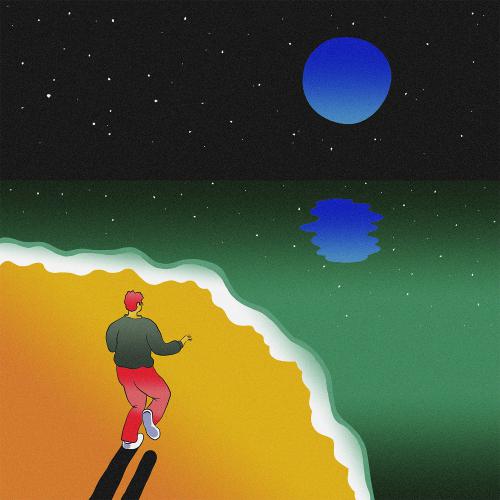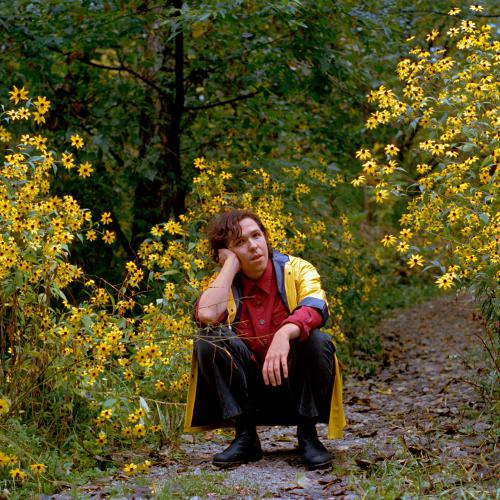Band: Luka Kuplowksy
Album: Stardust
VÖ: 02.10.2020
Label/Vertrieb: Mama Bird Recording Co. / Membran
Website: http://www.mamabirdrecordingco.com/lukakuplowsky
With his wonderful new album Stardust, Luka Kuplowsky makes a refreshing argument for the relevance of acoustic music as a place to hold thought; an open space to place impeccably chosen words, ideas and images. A young songwriter with a calm, conversational delivery and an effortless, un-showy grasp of poetry; Kuplowsky humbly picks up the same threads of inquiry that did Cohen, asking the big questions about love, meaning and consciousness. Musically, Stardust triangulates between Hejira and Late for the Sky, finding connections between the purity of simple melody and the tangled modulations of jazz. Luka Kuplowsky makes a music of contemplation, a music alive to the everyday possibilities of epiphany and revelation, an unhurried music that moves with the gentle and curving rhythms of thought.
From the first note, Stardust feels fresh and immediate, and this immediacy is no accident. The album was recorded in just two days, in a studio with almost no isolation, with an all-star band of musicians drawn from the rich jazz and improvisational scenes of Toronto. Vocals and nearly everything else was recorded live, in an act of pure trust, and the album truly captures a performance, an assembly of players discovering the songs in real time.
Musically, you might refer to Stardust as folk music. Then again, it would be difficult to slot this album in amongst the barn board and flannel aesthetic implications that word has taken on these days. Indeed, folk music has felt fenced in lately, trapped inside certain sentiments and chord progressions. In this context, Stardust feels like a breath of fresh air; by liberally inviting in groove, space, and jazz inflections, Kuplowsky builds a new space for folk music, a welcome expansion outwards for the genre.
Luka’s voice possesses something of the gravity of Leonard Cohen; he will turn a phrase in a way that draws attention to the words, to the fizzing of certain consonants, his nonchalant style also recalling the nearly spoken singing of Bill Callahan. But his ability with melody is far more complex; he brings this spoken gravitas to vivid and lovely melody, reminiscent maybe of Judee Sill, to her combination of melodiousness and frankness. At moments, the album brings to mind the seminal Mary Margaret O’Hara record Miss America; sharing with that record an interest in fretless bass and groove, and a rich Toronto music scene heritage. And yet, Stardust manages to hint at the unfettered freedom of Miss America while also being eminently accessible; open to all comers, entirely lacking in pretension.
Luka hails from an artistic family; one brother is a Japanese translator and the other works as a film curator and producer. Luka has an MA in film and works as an adjunct professor in the subject, and cinema is a medium through which he tends to speak. Asked about the characters on his record, he tends to bring up Aki Kaurismaki’s films; indeed, it’s not difficult to imagine the narrator in “Do I Have to Be”, a soused curmudgeon who wishes for a car, populating a film by the Finnish filmmaker. “If I had a car, I’d be drinking more reliably,” the narrator sings, and then longs for some kind of grandeur he cannot possess; “Do I have to be a king, something big, so I can drown in my sorrows?” Like the work of Kaurismaki, Luka’s writing walks a fine line between realism and melodrama - between cosmic imagery and minute observations; his characters perpetually longing for transcendence while still inhabiting the real world. He also cites Jean Cocteau as an influence, and indeed his songs nearly always have an element of romanticism and surrealism - “Feeling like a dolphin might / In conversation with the moonlight.” Elsewhere, he asks, “Did I make an angel blush, with my suffering, my loss?” The album, of course, is called Stardust, in direct reference to the Hoagy Carmichael song. Luka says he views songwriting itself as Hoagy’s “stardust melody,” a fleeting, yet necessary dream; a consolatory paradise for reflection on love and introspection.
Luka tends to laugh when he makes statements such as these. Onstage, he can present as the earnest troubadour, but his writing, refreshingly, would never be characterized as ‘emo’; it has pathos without pity, depths without despair. Though he says his songs tend to begin in a personal emotion, they don’t end there; rather, the arc of his writing always pulls upwards towards meaning, philosophy, poetry. None dissolve into navel gazing or self pity. It’s refreshing to encounter a young songwriter with such philosophical ambition. Nearly every song has some new idea, some freshness that feels rare. As Kuplowsky sings, "I can't remember / The sky having so much colour / Or the clouds so wild and bothered / The world refreshed / By what is lost."
The strength of the lyrics is ably supported by the strength of the music. According to Luka, the intention of the record has as much to do with the players as the songs. “It was the first time,” he says, “that I had the guts to ask some of these people to play with me.” He describes his admiration for local guitarist and songwriter Thom Gill (Sam Amidon) as being instrumental to the conception of the album. “The e-sus chord in ‘Rough Times’ is there because of Thom - it’s a reference to his song ‘Such Is Your Triumph’,” says Kuplowsky. Drummer Evan Cartwright (U.S. Girls), a long time Luka collaborator, was a must, and Kuplowsky says that part of forming the band was thinking about who Evan played with, “because I respect Evan so much.” Josh Cole (Sandro Perri) appeared in the band, for his facility with fretless bass, as well as his associations with Cartwright and Brodie West (Broken Social Scene, The Ex), the jazz saxophonist and composer who contributes thoughtful pentatonic melody throughout the album. Flute prodigy Anh Phung rounded out the studio band, and ace singers Felicity Williams (Bahamas) and Robin Dann (Bernice) sang backups.
With such a cast of players, it could have been easy for the album to disappear under a weight of notes. Instead, the record feels like a duet between the songs and the musicians, all of whom are given real space to shine. Neither is subordinate to the other. The players are given long leads with which to solo; the songs too come through crystal clear. Engineer and mixer Stephen Prickett accomplishes something very difficult with this album; sonically, there is what feels like endless space around each instrument and between every beat. The album feels very whole and integrated, and also like the voice of each player is clearly preserved.
The band from Stardust was also featured on Judee Justin Arthur Mary, an EP released this past spring as Kuplowsky’s debut with Mama Bird Recording Co. and Next Door Records. The EP is a collection of covers of some of Luka’s formative songwriting influences: Judee Sill, Justin Haynes, Arthur Russell, Mary Margaret O’Hara. In recent years, Kuplowsky has been a primary organizer of The Holy Oak Family Singers, a loose collection of musicians presenting a panoply of tribute nights at various small venues around Toronto. The nights were as much about community building as they were about celebrating songcraft, a way of knitting together musicians otherwise away on tour or cloistered in recording projects. The band was named after seminal venue The Holy Oak, now defunct; a 50 cap room in the west end of the city which fostered an entire scene of musician’s musicians and writer’s writers, a scene that cares nothing for commercial success and mostly exists for itself. Kuplowsky recalls entering The Holy Oak for the first time in his early 20s, as someone who thought he “didn’t like modern music.” He changed his mind upon encountering writers like Alex Lukashevsky, Thom Gill, Sandro Perri, Jennifer Castle; musicians who became friends, influences, members of his band. Toronto has a bad reputation; it can be seen as just another big city with expensive housing and competitive tastes. Yet, this deeply collaborative, deeply exploratory music scene has survived and thrived within it, almost despite it. Stardust is a result of this community; it springs forth from a place where jazz composers find common cause with folk musicians, and everybody mutually agrees to care for nothing but the music. It’s no accident that this album is so ambitious, so unusual, so warm.
The cover of Stardust was designed by Luka’s brother, the translator, in homage to the Japanese editions of Murakami books he read as he learned the language. It depicts an image of pure longing; a naif reaching towards moonlight across the water. In the end, Stardust evokes this same reaching out; this seeking quality. There is darkness here; “Don’t put pressure on my bruise / I have a weakness for the blues,” sings Kuplowsky in “Be New”. But as he continues on, he sings; “And if you kiss me lightly / I may hardly feel it / I’ll be new,” guitarist Thom Gill contributes a wild, near out of control guitar solo, and the song and album ends unexpectedly on an unresolved minor chord, still searching, still looking ahead.
~ written by Tamara Lindeman


